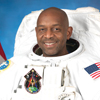|
by Cindy
Abole
Public Relations
A former NASA
astronaut who graduated from a
South Carolina high school visited
MUSC to tell of his travels 240
miles above the earth and what
it's like to walk in space.
Retired
astronaut Robert L. Satcher Jr.,
M.D., Ph.D., the first orthopaedic
surgeon in space, was a guest
presenter at the Department of
Orthopaedic Surgery's Grand
Rounds.
 Dr. Robert Satcher
visited MUSC April 3 as part of
the Department of Orthopaedic
Surgery's Grand Rounds. Dr. Robert Satcher
visited MUSC April 3 as part of
the Department of Orthopaedic
Surgery's Grand Rounds.
Satcher, who
also is a musculoskeletal
oncologist, explored the effects
of microgravity on bone mass and
muscle strength. His visit
coincided with a scheduled talk as
the guest speaker of the
Charleston Orthopaedic Society
where he spoke about NASA's work
and progress in the area of
information technology in medicine
and its telemedicine program.
Satcher was
invited by Department of
Orthopaedic Surgery Chairman
Langdon A. Hartsock, M.D., who met
Satcher previously at a national
meeting. Satcher is a clinical
assistant professor in the
Department of Orthopaedic Oncology
at the University of Texas M.D.
Anderson Cancer Center in Houston.
Satcher addressed a small crowd
about his training and experiences
as a mission specialist and
medical officer aboard STS-129
(Atlantis) which flew in November
2009 as part of an 11-day
re-supply and maintenance mission
to the International Space
Station. Additionally, Satcher
logged more than 260 hours in
space which included more than 12
hours in two space walks using the
shuttle's robotic arm.
"I've always
had a desire to discover new
things. As a child, I loved
reading the history of Europeans
traveling the oceans and making
new discoveries. I was fascinated
by their courage and sense of
adventure. I knew that combining
my interests in science,
engineering and medicine was a
great fit for space exploration
and new discoveries."
As STS-129's
proxy scientist, Satcher was able
to conduct several experiments
during the multiple days in space,
evaluating sleep and circadian
rhythms (the biological clock that
influences sleep), immune system
response and changes to the body's
spine (upright and seated) in
microgravity.
Data from these
studies and experiments will help
scientists and researchers
understand changes to the human
body in preparation for longer
duration flights and future
missions possibly to the moon,
Mars or beyond, according to
Satcher. Research in manned
spaceflight shows the effects of
zero gravity to be very harsh on
the body, resulting in increased
bone loss and muscle atrophy. For
this reason, astronauts must
exercise their muscles daily to
maintain their strength.
Working with
the shuttle crew, Satcher studied
differences with endurance and
muscle strength during exercise.
There is promising research tying
studies in space to preserve bone
health during long-term space
flight and cancer research,
specifically with pharmacological
studies using bisphosphonates and
similar drugs used to treat
osteoporosis and improve bone loss
in cancer patients.
Orthopaedic
Surgery's Lee Leddy, M.D., said he
was impressed with the former
astronaut's career
accomplishments.
"I found it
amazing that Dr. Satcher was able
to do so much balancing his
clinical and research work while
pursuing his dream to fly in
space. His success is an
inspiration that one can aspire to
anything without limitations."
|



 Dr. Robert Satcher
visited MUSC April 3 as part of
the Department of Orthopaedic
Surgery's Grand Rounds.
Dr. Robert Satcher
visited MUSC April 3 as part of
the Department of Orthopaedic
Surgery's Grand Rounds.